State of Disc Golf 2019–Disc Buying Habits

We are getting into our busy season here at Infinite Discs! People are playing lots of disc golf which means they are buying lots of discs. So it seems like a perfect time to take a look back at our disc golf buying habits from 2018.
How Many Discs Do We Own?
First, let’s look at how many discs we own. Are we a bunch of hoarders? Let’s find out!
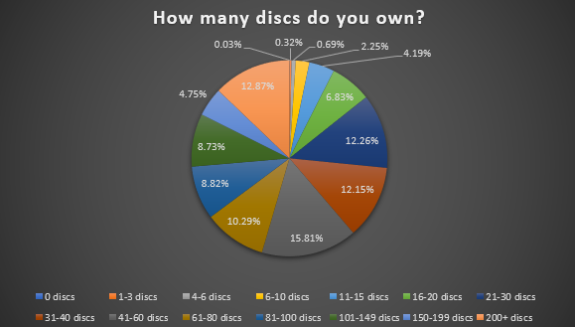
Surprise, (not really) we own lots of discs! The pie chart is a bit crowded, so here is a bar graph featuring the same information:
The most popular response was 41-60 discs, and from the pie chart we can see that almost 3/4 of us own more than 30 discs, which is more than you can fit in an average disc golf bag or cart. I remember when I first started playing disc golf and I saw someone on the course with a backpack full of discs. I thought there was no way I could ever own enough discs to fill a backpack bag. Now I have boxes and boxes of discs…
But that is the literal state of disc golf and disc ownership! And it is something that is pretty unique to our sport. You don’t see many golfers who have multiple bags of clubs, or casual basketball players who have closets full of different basketball shoes. We don’t just own the discs we need to play, but we also collect disc golf equipment.
How Many New Discs Though?
So how many new discs did we add to our collections in 2018? Again, here is both the pie chart and bar graph with this data:
So from this we could say that a rough “average” for the community as a whole is around 10-14 discs since a little over half of us bought at least 10 discs in 2018. I personally would say that is a little higher than I expected. 10 discs is a lot, especially for players who have a pretty established bag. But I think there are a couple of factors that drive us to buy more and more discs.
First of all, there are new releases. I usually write our quarterly sales reports on the blog, and almost every single time one of the top selling discs in every category is a new release disc. We for some reason in disc golf love trying out and collecting new disc molds, and there are definitely more than 10 new molds released every year.
I also think there is a sweet spot in the competitiveness and experience of disc golfers in correlation with how many discs we purchase. Beginners often purchase a lot of discs because they are excited about this new thing in their life and they are jumping in full swing. These new disc golfers are figuring out how to play and what molds will work in their bag. Then after maybe a year or more, once that disc golfer has gotten the hang of things, their purchasing may slow a bit.
This is that sweet spot. Experienced disc golfers who have for the most part found their comfort zone in the game. They don’t feel as strong of a need to buy more discs. However, if that experienced disc golfer becomes more competitive and play more frequently, they become more involved in the replacement market of disc golf. Depending on the types of courses they play, they might be losing more discs than average. Also their discs get worn in quicker and may need to be replaced sooner.
But something else that always needs to be remembered when analyzing this data is that the data is from people who cared enough about disc golf to take a survey put out by a disc golf company. We get a large number of respondents every year, but they are generally more active in the online disc golf community. So it makes sense that our numbers might be higher than expected when it comes to disc golf purchases.
How Many Discs Did We Collect?
Now, back to the data! And an interesting question that gets back to my comments earlier about us being collectors: How many discs did we acquire to collect and not throw? I think just the pie chart is sufficient for this one:
Again, we are collectors! Over half of us got a disc that we had no intention of ever throwing. This also doesn’t include discs that we collect but also want to throw a few times before hanging it on the wall or storing it away in plastic totes. This is great news for disc golf manufacturers and retailers. As we can see, their special edition, signature series, and first run discs are working in getting us to spend more money on new collectible discs.
But Where Do the Discs Come From?
So where do we get our new discs from? We asked that question, and provided survey takers with a variety of options for their responses. Here is how we answered:
As it is with the rest of the retail world, online is a dominant avenue through which we acquire new disc golf discs. So some may be surprised to see that the most popular selection was local disc golf stores that are focused primarily on selling disc golf equipment. This is encouraging for small business owners who have invested in building their own small business. It is also why companies like Dynamic Discs have opened several locations across the country.
But in a world that has seen brick and mortar stores go under because of the pressure from online retailers, why would most survey takers still buy discs from local stores? Again, this gets to a quirk in disc golf–there are benefits to seeing and holding a disc before you buy it. It is always nice to try on shoes and see them in person, but a size 11 of the same basketball shoe is going to be the exact same whether you buy it from a local Foot Locker or from Amazon or Eastbay online.
However, a max weight Star Destroyer from your local shop may be different from all of the max weight Star Destroyers available right now on Infinite Discs or any other online retailer. One might be more domey or have any other idiosyncratic feature you have learned that you like or dislike in your Star Destroyers.
I know when I worked in the warehouse at Infinite Discs I always got calls asking how flat a certain Champion Firebird was that we had listed online. Well when you shop in with a local disc golf store, you can inspect the disc however you want before buying your purchase. Due to overhead, some local stores may have higher prices than online retailers, but it may be worth the extra cost knowing exactly what you are getting before you buy it.
Over the last few years, I have been able to help out at our local Infinite Discs store in Pocatello, Idaho. I have seen the above scenario play out several times, but also I think a local pro shop is more inviting to newer players who may feel overwhelmed by all of the options available. Online retailers try their best to provide new players with information, but for many people it is nice to be able to have a face to face conversation with a store associate who knows about disc golf and are qualified to answer their questions.
But another interesting aspect of local disc golf stores being the most popular way that survey takers acquired discs is simply the fact that that many people have access to a dedicated local disc golf store. It would be interesting to know how many disc golf stores have opened over the last few years, but from this survey we know that at least over 60% of survey takers have access to a local disc golf shop, which is exciting for the growth of the sport.
So there you have it! What bit of data stood out to you? Is there something I failed to discuss that should have gotten more attention? Please let us know your thoughts and feelings in the comments!

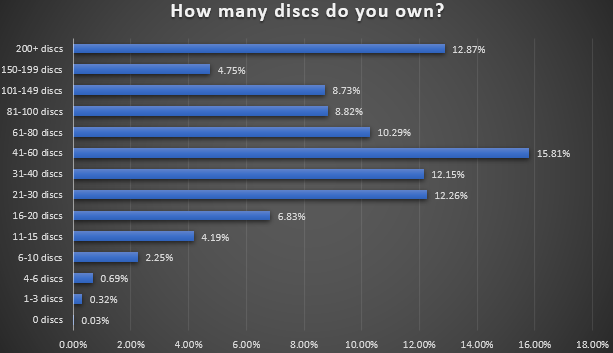
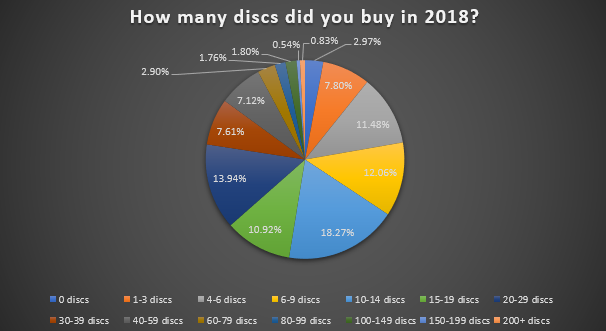
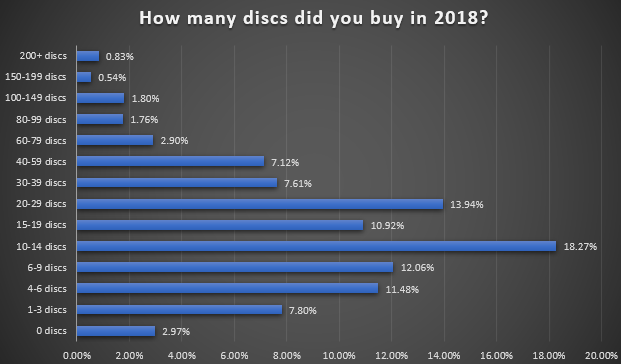
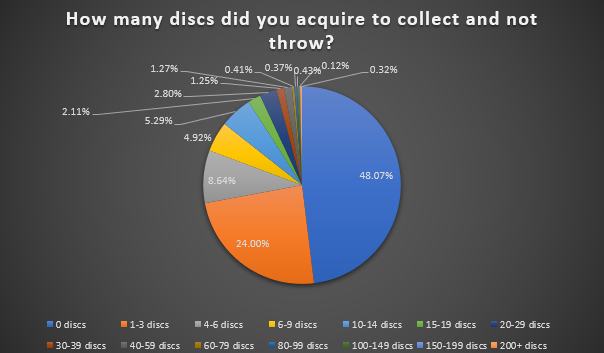
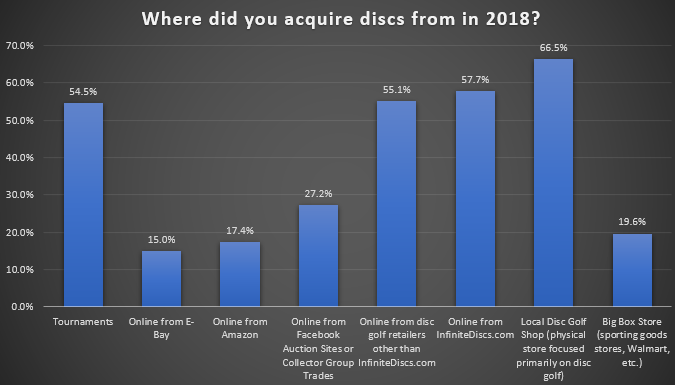
Get out credit card from wallet and purchase discs from Infinite each week! Lather, rinse, and repeat!
Every week on payday morning I purchase 3-4 disc, I feel ya
I agree that there is tons of opportunity for Brick and Mortar stores to gain traction. Here in Portland, one of the obstacles has been supply of inexpensive retail locations. Rent and Supply push the local stores to the outer suburbs no where near a good course. I’d visit my local shop 10X more if it wasn’t 15 miles out of my regular routine. There is a lost opportunity where convenience, selection, location meet.
I support my local disc golf store whenever they have what I am looking for which is most of the time. My local store does so much to support the local DG community that I don’t mind spending an extra 2 bucks on a disc.